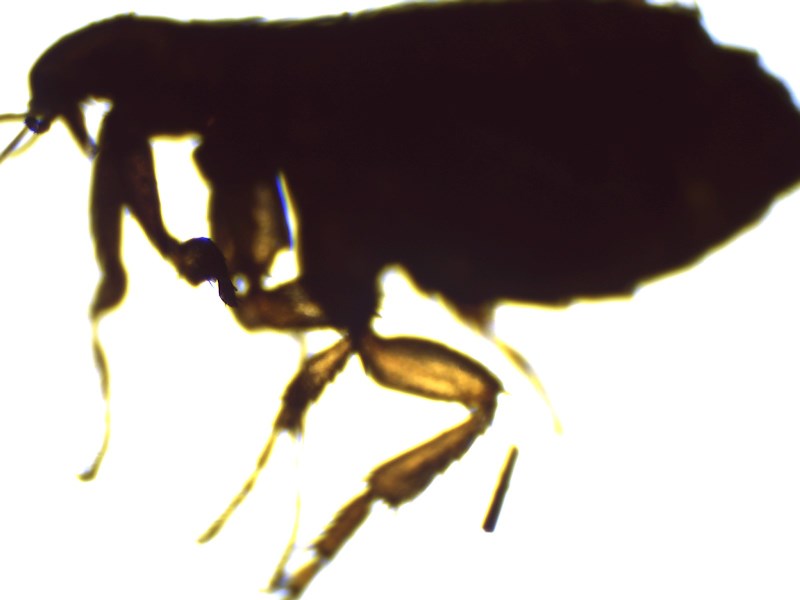If so, you are not alone! Fleas can be difficult to detect, and can gain quite a foothold before the problem is discovered. There has been a lot of discussion about the possibility that fleas are becoming resistant to certain drugs, but in fact this is not true. Understanding why it seems so difficult to get a flea problem under control requires an understanding of the biology of fleas. Fleas have a life cycle very similar to butterflies, with an adult (flea or butterfly), egg, larva (caterpillar), pupa (chrysalis) and back to adult.
The flea species that we deal with as a pest on our cats and dogs is the cat flea. The cat flea prefers cats, but is also happy on dogs, raccoons, and opossums. Although it will bite a person if nothing better is around, they do not prefer to live on humans. The adult flea lives exclusively on the host animal. The female cannot lay eggs until she has had a blood meal, and will begin laying eggs within a couple days of that first meal. She will then lay between 20 – 50 eggs per day, every day, for her entire 2 – 3 month life span.
The eggs roll off of the host and hatch within 3 – 5 days. Flea larvae are sensitive to the environment, requiring temperatures between 45 – 90 F and relative humidity between 50 – 85%. This stage typically lasts between 5 – 18 days, but can go much longer if the conditions are less favorable. The larvae then form pupae. At this stage they can stay dormant for up to 1 – 2 years, but will emerge within 3 days if the conditions are good. The newly-emerged adult jumps toward a shadow that crosses over it, and thus the host is reinfested.
The entire cycle takes about three weeks under optimal conditions, but up to three months at cooler temperatures. At any given time, about 5% of the population is in the adult stage, and the rest are eggs, larvae and pupae. To put it another way, if there are only 5 fleas on your pet, there are likely to be 95 immature fleas developing in your environment. This is part of the reason that you may still see fleas on your pet even after applying a product that kills adult fleas. If there are a lot of new fleas hatching out, they need to get on the pet in order to be killed by the product. And, if the conditions are right, new fleas may be emerging over three months, so sometimes it seems to get worse before it gets better.
Other issues that can complicate control are mistakes in applying the product, and sources of new fleas entering the environment. Topical products need to be applied to the skin according to the labeled instructions and at the labeled frequency. Being even a week overdue for an application can allow some fleas to survive long enough to lay eggs. It is also important not to give a bath within two days of application, either before or afterwards. New fleas can come from visiting animals to your home, or if your pet visits another home with fleas. Fleas are also emerging from the soil in most locations, so your pet can pick up new fleas in your yard or any other location it visits. It is even possible for you to bring fleas into your home to your indoor-only cat.
The best way to prevent fleas is by killing both the adults and the immature stages and treating all the animals in the house. A monthly topical product is useful for killing the adult fleas, and often will protect against other pests as well. A good way of preventing flea eggs from hatching is with the drug lufenuron. This is available as a monthly pill for dogs, or an injection given by the veterinarian that is good for 6 months for cats. Please discuss your situation with us, and we will be happy to help customize your control plan! And remember, it is easier to control than to treat an infestation, so don’t wait until you are seeing fleas to start your prevention.




